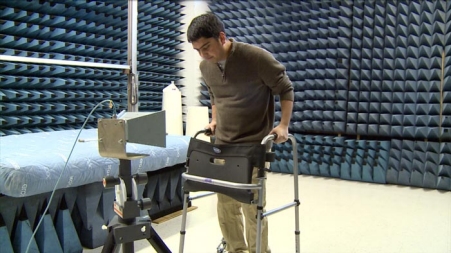Examining the Use of Through-the-Wall Radar Imaging to Assist the Elderly Living Alone

Dr. Amin’s graduate student helps with the experiment.
The United States is facing a great challenge as the number of aging Americans is rapidly rising. Right now, 40 million Americans are over the age of 65, and the Census Bureau predicts that by the year 2030, 80 million Americans will be 65 or older. Due to these rising statistics, families, communities and health care providers are at a cross-road in terms of how to best serve this growing aging population.
Many elderly individuals choose to live alone, which poses a great risk as falls and other ailments become more likely as a person ages. In order to increase the safety and security of an elderly person living alone, researchers at Villanova University are examining the use of through-the-wall radar technology to detect falls and monitor the elderly in their individual living spaces.
Dr. Moeness Amin, director of the Center for Advanced Communications in the College of Engineering, is the Principal Investigator for this project. An internationally recognized expert in the area of radar imaging, Dr. Amin’s research focuses on various applications for this technology, including search and rescue, defense, and law enforcement. He has edited two books on the subject and written more than 150 articles related to radar signal processing and imaging methods.
Dr. Amin and his team, through a grant from Qatar University, are now developing a series of algorithms to identify the patterns and routines of an elderly person in his or her home. The radar, with the help of these algorithms, can detect when a person is sitting, standing, walking, etc., and when a person is at risk for injury. Elderly motion detection and classification can be achieved in all rooms inside the home with one or few radar units, utilizing the radar capability of “seeing” through walls.
Graduate students in the College of Engineering were trained in walking, falling, and functioning like an elderly person and experiments were conducted in the radar-imaging lab on Villanova’s campus. Kelly Nestor, a clinical instructor in Villanova’s College of Nursing and an expert in the growing elderly population, educated and trained the students on how the elderly carry themselves and walk – with or without the assistance of canes or walkers.
